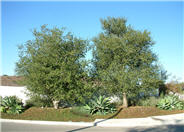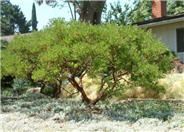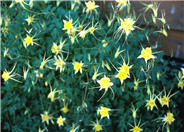
Common name:Coast Live Oak
Botanical name:Quercus agrifolia
The Coast Live Oak is an evergreen round headed tree. It can reach 15'-40' high and 20' wide; it grows very well from the coastal areas to the interior valleys. It is native to California, is drought tolerant, and attracts butterflies.

Common name:Howard McMinn Manzanita
Botanical name:Arctostaphylos densiflora 'Howard McMinn
This shrub is highly appreciated for its decorative characteristics, which include a dense show of small, pale pink urn-shaped flowers. Above all, it is the mahogany-red to brown bark (which peels beautifully) that is the major attraction. Its fruit resembles the tike apple, and the flowers contrast perfectly to the light green leaf (which can get rather tough). It blooms from late winter to spring.

Common name:Columbine
Botanical name:Aquilegia hybrids
Coumbine has large, spurred flowers with clear colors of white, lavender, yellow, deep red and pink which are borne on 2 1/2' tall plants. The strikingly beautiful blooms make good cut flowers. They require partial shade or full sun, along with well- drained soil. The colors, however, cannot be chosen.
Designer: Owen Dell
Photographer: GardenSoft
Practice grass-cycling by leaving short grass clippings on lawns after mowing, so that nutrients and organic matter are returned to the soil.
Drip and other smart irrigation delivers water directly to roots, allowing no excess water for weeds.